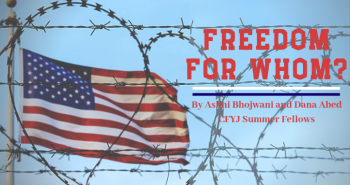Freedom for Whom?

As the United States approaches its 243rd Independence Day, one reflects on who in our country is entitled to the freedoms of “life, liberty, and the pursuit of happiness” that are embedded into our Declaration of Independence? Are we all truly seen as equals entitled to these unalienable rights? From the inception of U.S. Independence Day, it has been clear that only some Americans are granted such privileges. From the U.S. Constitution’s consideration of slaves to be 3/5 of a person, and the 13th amendment permitting enslavement for the incarcerated, it is clear that our founding fathers didn’t grant everyone freedom.
Nelson Mandella, perhaps one of the world’s biggest Freedom Fighters once said, “There can be no keener revelation of a society's soul than the way in which it treats its children.” Yet one need look no farther than the front page of a newspaper to see that in the U.S., our treatment of children is unconscionable. From children being forcibly separated from their parents while crossing our southern borders seeking asylum, to teens who come to the U.S. unaccompanied, to 8- and 9-year-olds locked in secure juvenile detention facilities, and 10-year-olds sleeping in adult jails and facing adult charges, it’s clear the United States has a long way to go in achieving the freedom it espouses every 4th of July.
Every year in the U.S., close to 76,000 youth are put into the adult criminal justice system, most of them for non-violent offenses. In looking at the racial disparities in the criminal and juvenile justice system, African American youth make up 17% of the overall youth population in the United States, yet they account for 30% of those arrested, 62% of the youth prosecuted in the adult criminal justice system, and more than 80% of those sentenced as adults. This Independence Day is a time to consider the shortcomings of our laws towards incarcerated children who, on a daily basis, are deprived of their liberty, rather than nurtured, supported and loved. The consequences of convicting children as adults go far beyond incarceration and affects their mental and physical health and their future. For children of color, who make up nearly 80% of those sentenced to adult time, they face an even worse fate.
Upon release and re-entry into society, these children carry the stigma of an adult criminal conviction and face difficulties carrying on with their lives, as it is now harder to find a job, housing, or enroll in college. They often lose the right to vote and many are unable to serve in the U.S. military. By locking these children in jails and prisons we are stripping them of their freedoms and liberties far too often for crimes that do not fit the punishment.
In looking to the future, we find ourselves hopeful in seeing the great strides towards freedom for all, by focusing on de-incarceration; blocking pathways for children into the adult system; by assisting children and families in accessing trauma-responsive services, in getting resources out of youth prisons and placing them back into communities; by redefining safety outside of our legal system, and creating restorative practices as solutions to injustice. But this extends beyond our justice system, and to other systems that continue to separate families, chose to advance harm over kindness, and criminalize those who seek a better life. To achieve these goals, the U.S. must first acknowledge our original sins of slavery and genocide; and to remedy the legacies of these acts of terror in our Constitution.
We ask that this Independence Day, you consider your own role in advancing freedom. Consider signing onto our pledge and ACT to End Racism. This year, we all need to pause and reflect on the future of our country, and the ways that we prevent youth from participating in their own freedoms, liberties, and pursuits of happiness.

